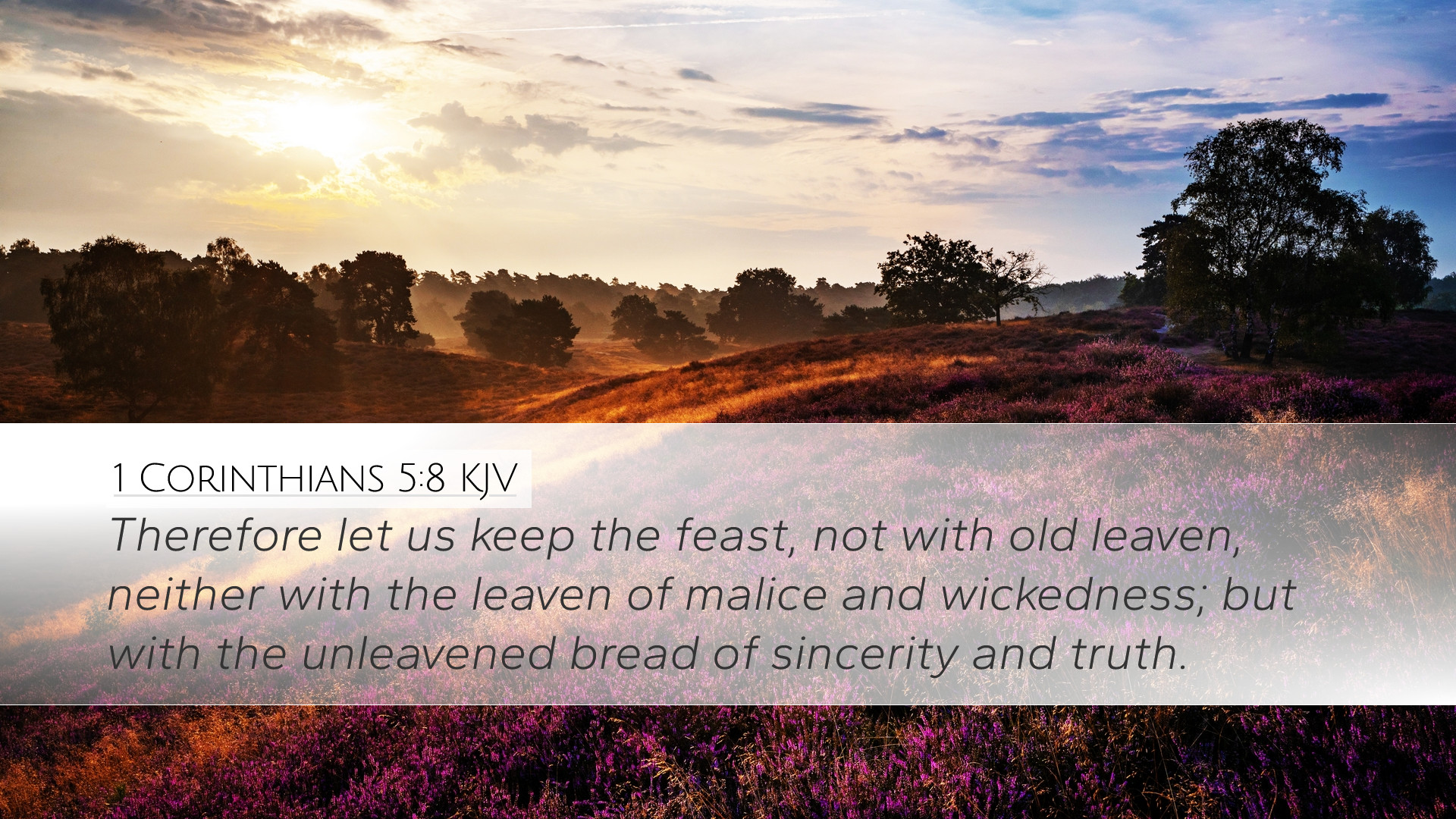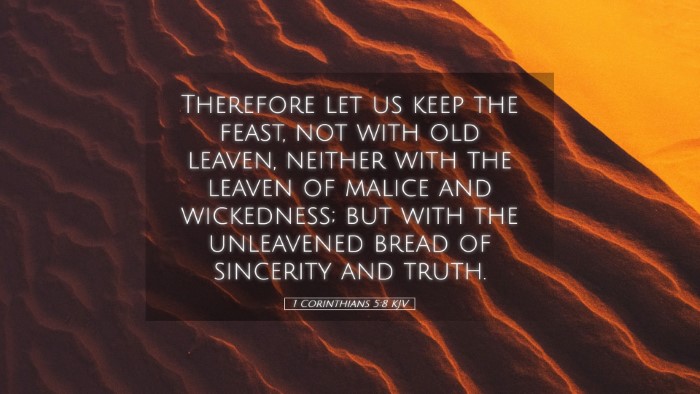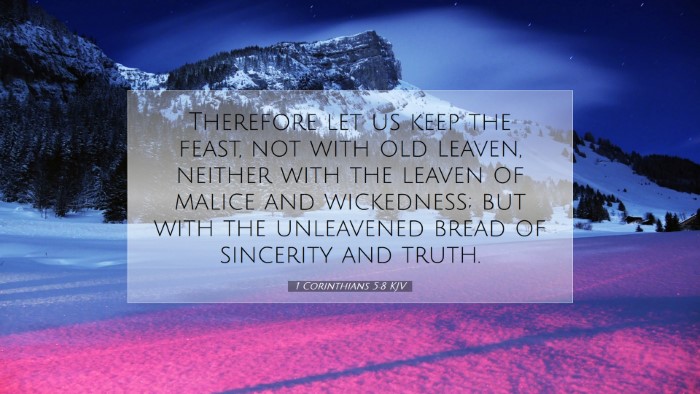Old Testament
Genesis Exodus Leviticus Numbers Deuteronomy Joshua Judges Ruth 1 Samuel 2 Samuel 1 Kings 2 Kings 1 Chronicles 2 Chronicles Ezra Nehemiah Esther Job Psalms Proverbs Ecclesiastes Song of Solomon Isaiah Jeremiah Lamentations Ezekiel Daniel Hosea Joel Amos Obadiah Jonah Micah Nahum Habakkuk Zephaniah Haggai Zechariah Malachi1 Corinthians 5:8
1 Corinthians 5:8 KJV
Therefore let us keep the feast, not with old leaven, neither with the leaven of malice and wickedness; but with the unleavened bread of sincerity and truth.
1 Corinthians 5:8 Bible Commentary
Commentary on 1 Corinthians 5:8
Verse Context: In 1 Corinthians 5:8, the Apostle Paul states, "Therefore let us keep the feast, not with old leaven, nor with the leaven of malice and wickedness, but with the unleavened bread of sincerity and truth." This verse is part of Paul's exhortation to the Corinthian church regarding moral purity and the appropriate response to sin within the community.
Overview of the Theme
This verse emphasizes the call to holiness and integrity among believers, contrasting the influence of sin (symbolized by "leaven") with the purity of sincerity and truth. Paul uses the metaphor of the Passover feast to communicate a deeper theological truth about the nature of Christian life and community.
Insights from Public Domain Commentaries
Matthew Henry's Commentary
Matthew Henry notes that Paul reflects on the Jewish Passover and its significance in relation to the Christian experience. He emphasizes the need for believers to remove the "old leaven," which represents sin and corruption, drawing a parallel to the Jewish practice of removing leaven from their homes during Passover. This act symbolizes a commitment to purity and a new beginning.
Henry further explains that the phrase "with the unleavened bread of sincerity and truth" highlights the essence of true worship. Sincerity refers to an undivided heart towards God, while truth emphasizes alignment with God's revelation. He underscores that genuine worship must be characterized by these qualities, setting apart the community of faith from the corrupting influences of the world.
Albert Barnes' Notes
Albert Barnes focuses on the metaphor of leaven as it pertains to sin. He elaborates on the idea that a little leaven can permeate a whole batch of dough, thereby corrupting it. This serves as a warning to the church against tolerating sin, suggesting that even minor transgressions can lead to significant consequences in the life of a congregation.
In comparison, Barnes emphasizes Paul’s call to embrace the "unleavened bread," which symbolizes the virtues of sincerity and truth. This, he argues, is foundational for communal life. Barnes also connects the call to a communal observance of the Lord's Supper, interpreting it as a celebration of the new life believers share in Christ, free from the corrupting influences of sin.
Adam Clarke's Commentary
Adam Clarke provides a thorough examination of the cultural and liturgical background of the Jewish Passover, indicating how Paul integrates this custom into Christian teaching. Clarke notes that the Corinthians' understanding of leaven must be viewed through the lens of their own cultural practices related to feasts and celebrations.
Clarke emphasizes that by contrasting "malice and wickedness" with "sincerity and truth," Paul delineates the moral obligations of the church. He remarks that true Christian liberty does not lead to licentiousness, but rather compels believers to a higher standard of living that reflects the character of Christ. Clarke encourages readers to view the removal of leaven as a personal and communal act of repentance and renewal.
Theological Implications
The theological implications of 1 Corinthians 5:8 are profound. Paul’s exhortation to keep the feast aligns with the overarching theme of redemption and the new life offered through Christ. This aligns with the concept of sanctification - the process of becoming more like Christ through the work of the Holy Spirit.
Christian Community and Holiness
This verse is a call to the Christian community to maintain holiness in both individual and collective practices. It challenges believers to reflect on the nature of their worship and the integrity of their conduct. By eradicating sin, believers are not merely striving for personal holiness; they are also contributing to the holiness of the body of Christ as a whole.
Worship in Sincerity and Truth
The dual principles of sincerity and truth stand as foundational for genuine worship. Sincerity requires a heart that is genuinely seeking God, while truth necessitates that worship be grounded in the reality of who God is as revealed in Scripture. Together, these principles guard against hypocrisy and promote an authentic, vibrant faith community.
Conclusion
1 Corinthians 5:8 serves as a powerful reminder for pastors, students, theologians, and scholars that the Christian life is one of continual renewal and transformation. As believers, they are called to navigate the tensions of culture and sin with a commitment to holiness, sincerity, and truth. Each celebration of the Lord's Supper becomes a reflection of that commitment, calling the community to embody the very essence of the Gospel in their lives.


